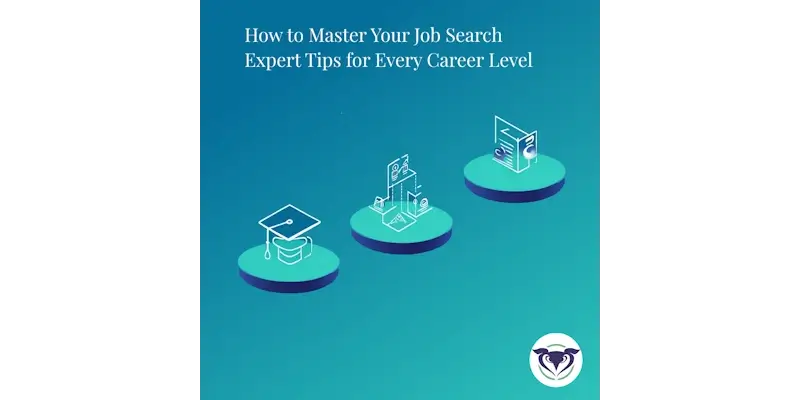How to Master Your Job Search: Expert Tips for Every Career Level
In today's dynamic job market, the approach to finding your next role must be as sophisticated as your career aspirations. Whether you're just starting out or leading organizations, understanding the nuances of job searching at your career stage can make the difference between landing a role and landing your dream role.
Entry-Level Professionals: Building Your Foundation
The entry-level stage is characterized by both excitement and uncertainty. You might be a recent graduate with a fresh degree, or perhaps you're making a career pivot into a new industry. At this stage, you're likely competing with peers who have similar educational backgrounds but varying levels of internship or part-time work experience. You might find yourself applying for roles like "Junior Analyst," "Associate Developer," or "Marketing Coordinator." The challenge isn't just finding any job—it's finding one that provides a strong foundation for your career trajectory. While some of your peers might accept the first offer they receive, successful entry-level professionals strategically target companies with strong training programs and growth potential. This might mean choosing a lower-paying role at a Fortune 500 company with excellent development opportunities over a higher-paying position at a smaller firm with limited advancement potential.
As you step into the professional world, your greatest assets are your potential and adaptability. While you might feel overwhelmed by job requirements, remember that companies are actively seeking fresh perspectives and digital-native talent.
Key Strategies for Entry-Level Success:
- Leverage Academic Projects and Internships
- Transform class projects into professional achievements
- Highlight leadership roles in student organizations
- Quantify results from internships, even if they seem small
- Create case studies from your academic research
- Emphasize collaborative projects that mirror workplace scenarios
- Build a Compelling Narrative Around Transferable Skills
- Identify skills from part-time jobs that translate to corporate settings
- Showcase problem-solving abilities through specific examples
- Highlight digital literacy and technical capabilities
- Demonstrate adaptability through various academic and extracurricular experiences
- Connect coursework to real-world business challenges
- Professional Documentation Support
- Many successful graduates hire someone to write a resume to ensure their documentation stands out
- Focus on translating academic achievements into business language
- Include relevant keywords from job descriptions
- Create a consistent personal brand across all platforms
- Develop a portfolio showcasing your best work
- Development Program Focus
- Research companies with structured training programs
- Look for mentorship opportunities
- Seek organizations with clear career progression paths
- Target companies that invest in employee education
- Consider rotational programs for broad exposure
Mid-Career Professionals: Leveraging Your Experience
The mid-career stage typically spans from 5 to 15 years of experience and represents a critical inflection point in your professional journey. You've likely progressed from your entry-level position through one or two promotions, perhaps moving between companies to accelerate your growth. At this stage, you might be a "Senior Manager," "Lead Developer," or "Regional Sales Director." You're no longer just executing tasks—you're developing strategies, leading teams, and driving initiatives. This is often when professionals face their first major career decisions: whether to deepen their technical expertise or transition into management, whether to remain in their current industry or leverage their skills in a new sector. The challenges are different now; instead of proving you can do the job, you're proving you can excel and innovate within it. Many mid-career professionals find themselves at a crossroads where they need to decide between the stability of their current role and the potential for greater advancement elsewhere.
At this stage, you've accumulated valuable experience and demonstrated your capabilities. Your job search strategy should reflect your refined professional identity and increased market value.
Mid-Career Search Tactics:
- Growth Opportunity Assessment
- Evaluate potential roles for leadership development
- Look for companies investing in emerging technologies
- Assess opportunities for cross-functional experience
- Consider international exposure possibilities
- Examine potential for strategic project leadership
- Achievement Showcase
- Document specific metrics and KPIs you've improved
- Highlight team leadership and development successes
- Showcase budget management and resource allocation skills
- Detail process improvements and efficiency gains
- Quantify customer satisfaction improvements
- Strategic Networking
- Join industry-specific professional associations
- Attend conferences and specialized workshops
- Contribute to industry publications
- Participate in mentorship programs
- Build relationships with key industry influencers
- Professional Positioning
- Many professionals at this stage pay for resume services to stand out
- Develop a thought leadership presence
- Create case studies from your successful projects
- Build a strong LinkedIn profile with recommendations
- Consider starting an industry blog or podcast
Senior Professionals: Strategic Career Moves
The senior professional stage, typically representing 15+ years of experience, is marked by strategic influence and organizational impact. You might hold titles like "Vice President," "Chief Technology Officer," or "Regional Director," where your decisions affect entire departments or organizations. At this level, the job search becomes highly nuanced—it's not uncommon for positions to be created specifically for exceptional candidates rather than existing as open roles. You're likely managing multi-million-dollar budgets, leading large teams, and driving organizational transformation. The challenges at this stage are often more complex: navigating board dynamics, managing shareholder expectations, or leading digital transformation initiatives. Your peers are other senior leaders who sit on boards, speak at industry conferences, and shape industry trends. The job search at this level often involves extensive due diligence, as your decisions can affect not just your career but the lives of hundreds of employees.
At the senior level, your job search becomes less about finding a position and more about identifying the right strategic opportunity. Your experience commands premium consideration, and your approach should reflect this.
Executive Search Strategies:
- Leadership Narrative Development
- Craft a compelling vision statement
- Document organizational transformation successes
- Highlight cross-functional leadership experiences
- Showcase strategic planning and execution
- Demonstrate industry influence and thought leadership
- Executive Network Cultivation
- Build relationships with board members
- Connect with private equity and venture capital firms
- Participate in executive forums and roundtables
- Engage with industry analysts and media
- Join advisory boards
- Personal Brand Management
- Develop a strong speaking platform
- Publish industry insights and analysis
- Maintain an executive social media presence
- Contribute to business publications
- Build relationships with executive search firms
- Strategic Career Services Investment
- Many executives hire someone to write a resume that positions them for board roles
- Invest in executive coaching
- Develop a comprehensive personal marketing strategy
- Create a strong digital presence
- Build a professional portfolio of achievements
Universal Principles for Success
Regardless of your career stage, certain principles remain constant:
- Strategic Documentation
- Whether you hire someone to write a resume or craft it yourself, ensure your documents tell a compelling story
- Maintain consistent messaging across all platforms
- Update materials regularly with new achievements
- Tailor documentation for specific opportunities
- Include metrics and quantifiable results
- Continuous Learning
- Stay current with industry certifications
- Develop adjacent skill sets
- Follow industry thought leaders
- Participate in professional development programs
- Learn emerging technologies in your field
- Network Nurturing
- Maintain regular contact with key connections
- Offer value to your network consistently
- Participate in industry events
- Share relevant insights and opportunities
- Support others in their career development
- Digital Presence
- Maintain an updated LinkedIn profile
- Share industry insights regularly
- Engage with relevant content
- Build a professional website if appropriate
- Monitor your online reputation
- Value Proposition
- Clearly articulate your unique strengths
- Develop your personal brand statement
- Identify your target audience
- Communicate your career vision
- Demonstrate your impact potential
Investment in Your Future
While some hesitate to pay for resume services or career coaching, consider this: your career documents are often your first impression on potential employers. The return on investment for professional career services can be substantial, potentially leading to better opportunities and higher compensation.
Moving Forward
Your job search strategy should evolve as your career progresses. Stay proactive, invest in your professional development, and don't hesitate to seek expert guidance when needed. Whether you're crafting your first professional resume or positioning yourself for a C-suite role, remember that your career journey is a continuous evolution of growth and opportunity.
Remember, the most successful professionals understand that career development is an ongoing investment. Whether you choose to hire someone to write a resume or invest in other career services, focus on presenting yourself as the valuable professional you are.



0 Comments